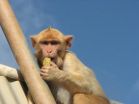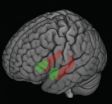Monkeys also believe in winning streaks, study shows
2014-06-27
(Press-News.org) Humans have a well-documented tendency to see winning and losing streaks in situations that, in fact, are random. But scientists disagree about whether the "hot-hand bias" is a cultural artifact picked up in childhood or a predisposition deeply ingrained in the structure of our cognitive architecture.
Now in the first study in non-human primates of this systematic error in decision making, researchers find that monkeys also share our unfounded belief in winning and losing streaks. The results suggests that the penchant to see patterns that actually don't exist may be inherited—an evolutionary adaptation that may have provided our ancestors a selective advantage when foraging for food in the wild, according to lead author Tommy Blanchard, a doctoral candidate in brain and cognitive sciences at the University of Rochester.
The cognitive bias may be difficult to override even in situations that are truly random. This inborn tendency to feel that we are on a roll or in a slump may help explain why gambling can be so alluring and why the stock market is so prone to wild swings, said coauthor Benjamin Hayden, assistant professor brain and cognitive sciences at the University of Rochester.
Hayden, Blanchard, and Andreas Wilke, an assistant professor of psychology at Clarkson University, reported their findings in the July issue of the Journal of Experimental Psychology: Animal Learning and Cognition.
To measure whether monkeys actually believe in winning streaks, the researchers had to create a computerized game that was so captivating monkeys would want to play for hours. "Luckily, monkeys love to gamble," said Blanchard. So the team devised a fast-paced task in which each monkey could choose right or left and receive a reward when they guessed correctly.
The researchers created three types of play, two with clear patterns (the correct answer tended to repeat on one side or to alternate from side to side) and a third in which the lucky pick was completely random. Where clear patterns existed, the three rhesus monkeys in the study quickly guessed the correct sequence. But in the random scenarios, the monkeys continued to make choices as if they expected a "streak". In other words, even when rewards were random, the monkeys favored one side.
The monkeys showed the hot-hand bias consistently over weeks of play and an average of 1,244 trials per condition. "They had lots and lots of opportunities to get over this bias, to learn and change, and yet they continued to show the same tendency," said Blanchard.
So why do monkeys and humans share this false belief in a run of luck even when faced over and over with evidence that the results are random? The authors speculate that the distribution of food in the wild, which is not random, may be the culprit. "If you find a nice juicy beetle on the underside of a log, this is pretty good evidence that there might be a beetle in a similar location nearby, because beetles, like most food sources, tend to live near each other," explained Hayden.
Evolution has also primed our brains to look for patterns, added Hayden. "We have this incredible drive to see patterns in the world, and we also have this incredible drive to learn. I think it's very related to why we like music, and why we like to do crossword puzzles, Sudoku, and things like that. If there's a pattern there, we're on top of it. And if there may or may not be a pattern there, that's even more interesting."
Understanding the hot-hand bias could inform treatment for gambling addiction and provide insights for investors, said Hayden. "If a belief in winning streaks is hardwired, then we may want to look for more rigorous retaining for individuals who cannot control their gambling. And investors should keep in mind that humans have an inherited bias to believe that if a stock goes up one day, it will continue to go up."
The results also could provide nuance to our understanding of free will, said Blanchard, who was drawn to the study of decision making during prior graduate training in philosophy. "Biases in our decision-making mechanisms, like this bias towards belief in winning and losing streaks, say something really deep about what sorts of creatures we are. We often like to think we make decisions based only on the information we're conscious of. But we're not always aware of why we make certain decisions or believe certain things.
"We're a complex mix of biases and heuristics and statistical reasoning. When you put it all together, that's how you get sophisticated behavior. We don't know where a lot of these biases come from, but this study—and others like it—suggest many of them are due to cognitive mechanisms we share with our primate relatives," said Blanchard.
This research was supported by grants from the National Science Foundation and the Brain and Behavior Research Foundation to Hayden.
INFORMATION:
ELSE PRESS RELEASES FROM THIS DATE:
EARTH Magazine: Rosetta off to decipher a comet's secrets
2014-06-27
Alexandria, Va. — "Hello World." Upon hearing that brief message, scientists at the European Space Agency (ESA) and followers around the world sent up a collective cheer. Rosetta — the ESA spacecraft currently on a 10-year mission to orbit and land on a comet — awoke in January after a three-year hibernation, and was ready to get to work.
The Rosetta spacecraft launched on March 2, 2004, to study Comet 67P/Churyumov-Gerasimenko. In August, Rosetta will enter the comet's orbit. By November, scientists will plant a lander on the comet, in the hope of learning more about ...
Early life stress can leave lasting impacts on the brain
2014-06-27
MADISON, Wis. — For children, stress can go a long way. A little bit provides a platform for learning, adapting and coping. But a lot of it — chronic, toxic stress like poverty, neglect and physical abuse — can have lasting negative impacts.
A team of University of Wisconsin-Madison researchers recently showed these kinds of stressors, experienced in early life, might be changing the parts of developing children's brains responsible for learning, memory and the processing of stress and emotion. These changes may be tied to negative impacts on behavior, health, employment ...
Are conservatives more obedient and agreeable than their liberal counterparts?
2014-06-27
Over the last few years, we've seen increasing dissent among liberals and conservatives on important issues such as gun control, health care and same-sex marriage. Both sides often have a difficult time reconciling their own views with their opposition, and many times it appears that liberals are unable to band together under a unifying platform. Why do conservatives appear to have an affinity for obeying leadership? And why do conservatives perceive greater consensus among politically like-minded others? Two studies publishing in Personality and Social Psychology Bulletin ...
Extinct undersea volcanoes squashed under Earth's crust cause tsunami earthquakes, according to new research
2014-06-27
New research has revealed the causes and warning signs of rare tsunami earthquakes, which may lead to improved detection measures.
Tsunami earthquakes happen at relatively shallow depths in the ocean and are small in terms of their magnitude. However, they create very large tsunamis, with some earthquakes that only measure 5.6 on the Richter scale generating waves that reach up to ten metres when they hit the shore.
A global network of seismometers enables researchers to detect even the smallest earthquakes. However, the challenge has been to determine which small ...
Climate change and the ecology of fear
2014-06-27
Climate change is predicted to have major impacts on the many species that call our rocky shorelines home. Indeed, species living in these intertidal habitats, which spend half their day exposed to air and the other half submerged by water, may be subjected to a double whammy as both air and water temperatures rise. Given the reliance of human society on nearshore coastal ecosystems, it is critical that we better understand how climate change will affect them.
In a recent study published in Global Change Biology, Northeastern University professor Geoffrey C. Trussell, ...
New report evaluates progress of comprehensive everglades restoration plan
2014-06-27
WASHINGTON – Although planning for Everglades restoration projects has advanced considerably over the past two years, financial, procedural, and policy constraints have impeded project implementation, says a new congressionally mandated report from the National Research Council. Timely authorization, adequate funding levels, and creative policy and implementation strategies are needed to achieve restoration benefits and to expedite implementation of the Central Everglades Planning Project. Climate change and the invasion of nonnative plant and animal species further challenge ...
USAMRIID research sheds light on how deadly lassa virus infects cells
2014-06-27
Scientists have discovered that the Lassa virus, which is endemic to West Africa, uses an unexpected two-step process to enter cells. The results, published in today's edition of the journal Science, suggest that the mechanism by which Lassa virus causes infection is more complicated than previously known.
An international team of scientists from the Netherlands Cancer Institute, Harvard Medical School, the University of Kiel in Germany, and the U.S. Army Medical Research Institute of Infectious Diseases (USAMRIID) collaborated on the study, which could lead to new approaches ...
AJMC publishes results showing big data analytics can predict risk of metabolic syndrome
2014-06-27
CAMBRIDGE, Mass. and HARTFORD, Conn. – June 27, 2014 – Research published today in the American Journal of Managed Care demonstrates that analysis of patient records using state-of-the-art data analytics can predict future risk of metabolic syndrome. More than a third of the U.S. population has metabolic syndrome, a condition that can lead to chronic heart disease, stroke and diabetes. These conditions combine to account for almost 20 percent of overall health care costs in the U.S. The study was conducted by Aetna (NYSE: AET) and GNS Healthcare Inc. (GNS), a leading provider ...
Prevention incentives
2014-06-27
A spoonful of sugar helps the medicine go down—and so do movie tickets, cell phone minutes and discounts on airline flights.
A private South African health plan increased patient use of preventive care such as mammograms and influenza vaccine with a program that incentivized healthy behavior using discounts on retail goods and travel. The study, which was led by researchers at Harvard Medical School and the RAND Corporation, was published today in The American Journal of Managed Care.
"Even though most people know that preventive care is important, too few people take ...
Extinct undersea volcanoes squashed under Earth's crust cause tsunami earthquakes, according to new
2014-06-27
New research has revealed the causes and warning signs of rare tsunami earthquakes, which may lead to improved detection measures.
Tsunami earthquakes happen at relatively shallow depths in the ocean and are small in terms of their magnitude. However, they create very large tsunamis, with some earthquakes that only measure 5.6 on the Richter scale generating waves that reach up to ten metres when they hit the shore.
A global network of seismometers enables researchers to detect even the smallest earthquakes. However, the challenge has been to determine which small ...


